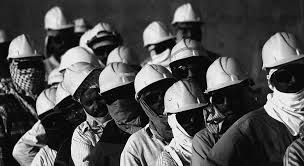By Andrew Warshaw
November 22 – The European Parliament is the latest body to denounce Qatar’s treatment of migrant workers with a powerful demand to the authorities to radically improve human rights and put an to end to “forced and slave labour”.
United Nations officials, Amnesty International and string of other human rights organisations and trade unions have all exposed the scale of the problem in recent days as the pressure mounts on the 2022 World Cup host nation to act swiftly to reform working conditions and living standards and stop the withdrawal of wages.
European Members of Parliament, joining the chorus of disapproval, noted that at least 500,000 more migrant workers are expected to be recruited for World Cup construction sites.
FIFA have described the situation in the Gulf state as unacceptable but the European Parliament said Sepp Blatter’s organisation had to take concrete steps and could not simply “brush major human rights concerns under the table”.
Passing an emergency resolution, they expressed their concern over “long working hours, hazardous working conditions, workers being unpaid for months, their passports being confiscated, forced to live in overcrowded labour camps, denied the right to form unions, and without access to free drinking water in extreme heat”.
Around 88% of Qatar’s 2 million population is made up of migrant workers, the highest ratio in the world. The International Trade Union Confederation (ITUC) has warned that 4,000 workers could die in the build-up to 2022 if the government does not take urgent measures.
The resolution reminded FIFA “that its responsibility goes beyond the development of football and the organisation of competitions”.
Barbara Lochbihler, chair of the European parliament’s subcommittee on human rights, said the resolution sent “an important signal both to the Qatari government and international football authorities on the need to take urgent action to address the situation regarding forced and slave labour in Qatar.”
“While we regret that centre-right MEPs succeeded in removing a core demand, calling for the abolishment of the kafala system, the resolution nonetheless highlights the fundamental flaws of this system, which pushes thousands of migrant workers into a situation of forced labour. We would urge the Qatari government to repeal the kafala system as a matter of urgency and for FIFA to prioritise this in its relations with Qatar in the context of the World Cup.
“FIFA must be reminded that it cannot continue to carry on with business-as-usual and brush the major human rights concerns in Qatar under the table. It must belatedly take concrete steps to ensure the preparations for the 2022 World Cup in Qatar do not lead to further human rights violations.”
In a 35-22 vote with four abstentions, the parliament said it plans to send a fact-finding mission to Qatar next year. It appealed to European companies involved in building stadiums or other infrastructure projects in Qatar “to provide working conditions that are in line with international human rights standards.”
The Qatari government has engaged the law firm DLA Piper – which has consistently refused public comment – to conduct an independent investigation of abuses and reacted to the European Parliament resolution by describing it as “premature”.
“Qatar takes the allegations that have been made concerning the construction sector extremely seriously and has therefore already put an independent review into those allegations in place, to be conducted as a matter of the utmost urgency,” the Qatar foreign ministry said. “Qatar will deal severely with any abuses on the part of companies operating in its construction sector, particularly relating to its migrant labour force.”
Before the European Parliament session began, Lochbihler implied the World Cup should not have been awarded to a country with such poor standards on workers’ rights and that FIFA should have taken this into account.
“The response of FIFA to date has been hesitant,” she said. “FIFA must have been aware of the existing problems in Qatar before awarding the country the World Cup. They should have conditioned their decision on the implementation of concrete human rights reforms, but decided to simply push ahead.
“It is not too late for FIFA and UEFA to at last shoulder their responsibility. Together with the active support of its European members, FIFA must send a clear message to Qatar to take immediate steps to address the human-rights situation of migrants.”
FIFA, anxious not to lose the moral ground, welcomed the European Parliament resolution and said it was “in line with the next steps that were agreed” at Wednesday’s meeting with the International Trade Union Confederation (ITUC) which called on Qatar to introduce improved labour standards “quickly, consistently and on a sustained basis.”
“FIFA, as world football’s governing body and the organiser of football’s flagship event, strongly believes that football can play an important role in generating public awareness and triggering positive social change in the host country of the 2022 FIFA World Cup,” a statement said.
“In order to achieve a sustainable improvement of working conditions in Qatar and the wider region, a joint effort by FIFA, the business sector, the international community and the Qatari authorities is required.
“FIFA remains open to cooperate with all relevant bodies and authorities to tackle this issue and to ensure that the protection of migrant workers continues to be addressed with urgency.”
Contact the writer of this story at moc.l1751516580labto1751516580ofdlr1751516580owdis1751516580ni@wa1751516580hsraw1751516580.werd1751516580na1751516580

